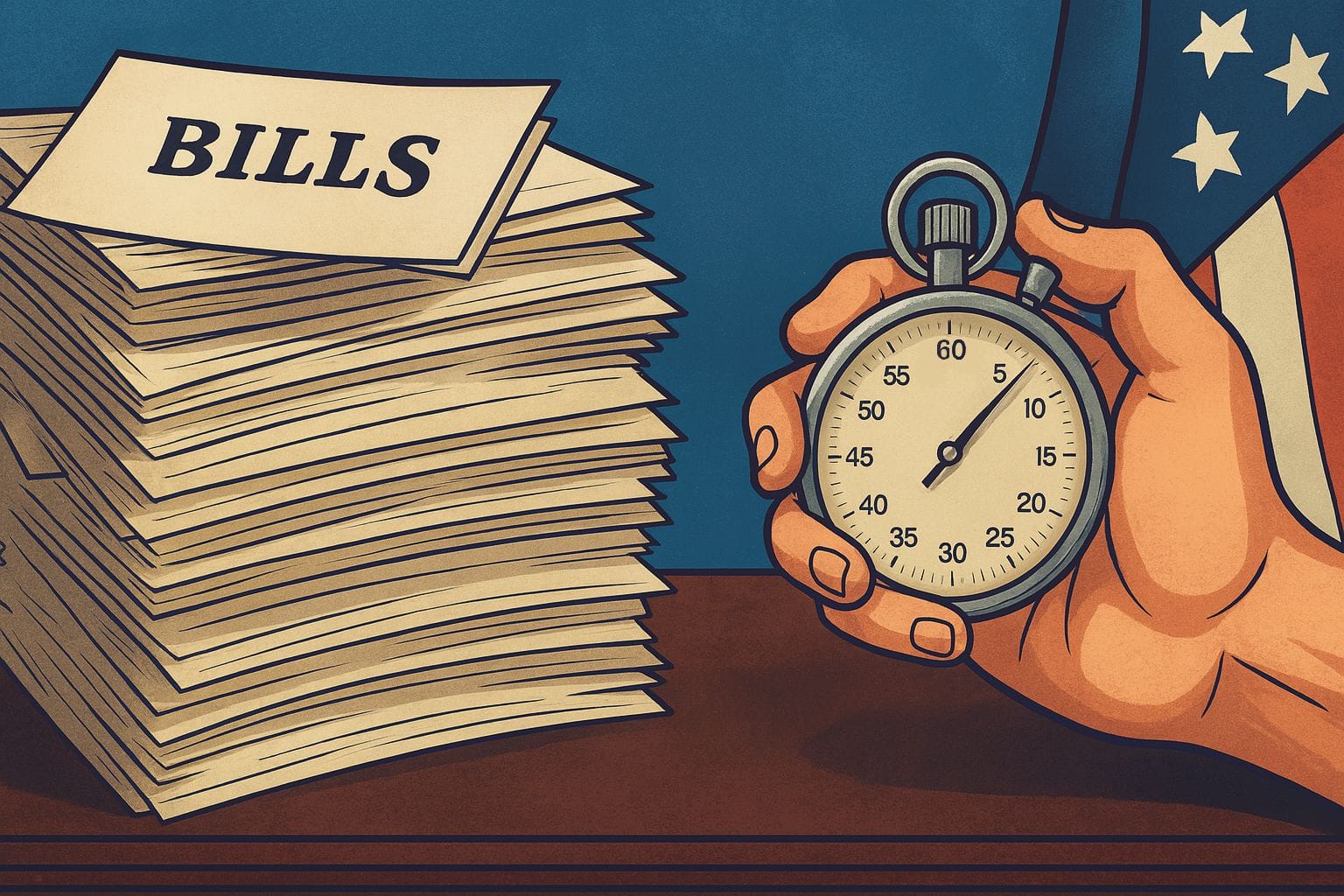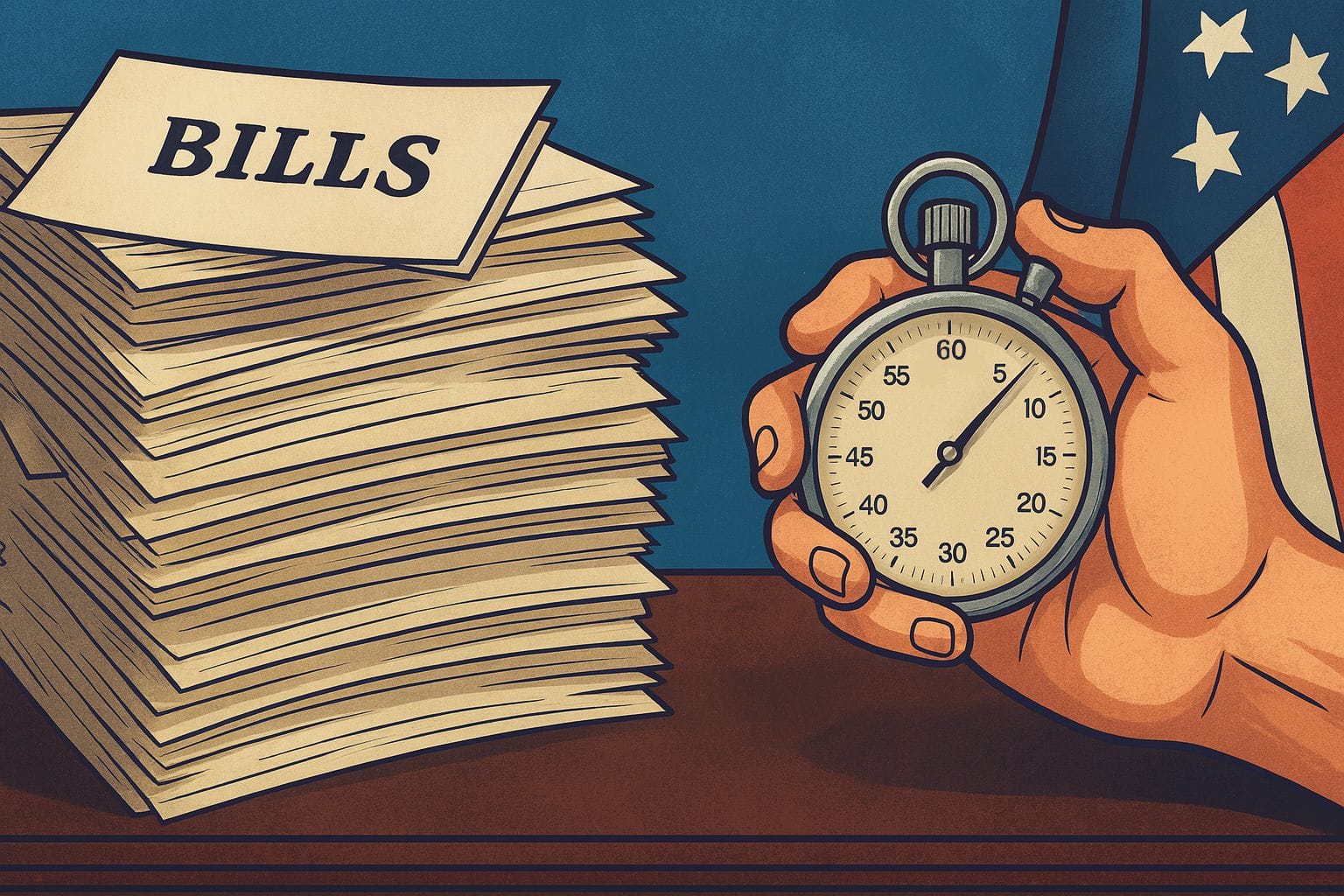This post originally appeared at https://www.badgerinstitute.org/plenty-of-time-left-for-good-policy-in-wisconsin-legislature/
Unfinished business includes ways of blocking corrosive ideas and permitting freedom to flourish
Wisconsin’s biennial budget is passed and lawmakers are out of Madison, at least until after Labor Day.

But the calendar says Wisconsin’s Legislature has time set aside for work at least through next March. Expectations may be running high that Democrats will seize majority status thanks to new legislative maps drawn in their favor and the historic pattern of parties not in the White House benefiting during midterms. The state Supreme Court decision killing the Legislature’s oversight of state agencies’ power to decree rules may also dishearten majority Republicans.
But there are 541 days until the next Legislature’s sworn in, and there’s plenty of unfinished business. Here’s the Badger Institute’s reckoning of good policy that most deserves a shot from the Legislature:
Stop chasing away accountants: Wisconsin requires more class time from would-be accountants before they’re allowed to sit for the CPA exam than our neighbors in Minnesota and Iowa do. About 20 states now have backed off requiring what amounts to a fifth year of undergraduate education, a difference of about $100,000 in tuition and lost earnings for Wisconsinites.
A bill could be drafted in the Assembly by next month. If our two politically opposite western neighbors can agree on this reform, it may be able to find bipartisan support in Madison.
School freedom, property tax relief: Wisconsin school finance is complicated, but especially for state funding that follows children to private schools under Wisconsin’s popular parental choice programs. One flaw: Outside Milwaukee, the state aid for parental choice schools first flows through the books of the school district where the student lives before going to the private school she actually attends. Local districts then have the option of requiring property taxpayers to make up for the district’s “loss” of revenue for that year.
The accounting quirk also affects some, but not all, independent public charter schools.
It doesn’t work this way in Milwaukee, where choice funding flows right to the school a kid’s parents pick. A bill to similarly “decouple” parental choice schools from property taxes in the rest of Wisconsin didn’t pass in 2024, mostly because opponents of choice want a political talking point. Now’s the time to give taxpayers in the rest of Wisconsin the relief Milwaukee already has.
Follow the plan: Wisconsin houses have sharply turned expensive, hurting homeownership and pricing out essential workers. Part of the problem is just fewer lots where building is allowed, and lot-size rules and regulatory delays drive up prices. One key reform would be to ensure that zoning, which governs what can be built on a parcel, matches a community’s comprehensive plan, the decennial document developed in a deliberative public process. This would give home developers certainty about what a community will permit.
The alignment of zoning to comprehensive plans, say Capitol sources, may be part of a package of housing reforms. Details aren’t yet clear, but other reforms may include broader permission for small accessory dwelling units, or “granny flats,” added to existing homes.
Faster settlements: For seven years, Wisconsin experimented with a specialized court for handling business-to-business disputes, leading to faster resolutions of complex cases. Support was bipartisan, but backers fretted that the state Supreme Court’s new liberal majority wouldn’t renew the pilot after opposition from insiders dissatisfied over judicial assignments or to treating businesses well. Then, the Supreme Court’s four progressive members killed the program last fall.
House Speaker Robin Vos (R-Rochester) last summer promised a bill to revive the program, and such a bill, AB76, passed on party lines in spring. It hasn’t yet been vetoed by Gov. Tony Evers, but Capitol sources expect him to toe his party’s line. If he does, it would be an opportunity for the majority to try again — or to start the constitutional amendment process.
Back to work: Perhaps half of state employees may still be working from home, but no one is sure, since agencies aren’t bothering to count. A pair of bills would tighten up work attendance rules that went slack during the pandemic, and while Evers threatened to veto them, a floor vote is expected at some point. Passing legislation would make the governor go on record in favor of not having to show up.
“Free” lunches: Hundreds of schools in Wisconsin provide taxpayer-funded lunches not just to children from low- to moderate-income families but to the kids of well-off parents, too. Democrat lawmakers last winter proposed doing that statewide, saying that subsidizing lunches for families that don’t need the help makes everyone feel better about dependency. The bills went nowhere, but state educrats and Evers favor the idea. Now would be an ideal moment for the legislative majority to protect taxpayers and civic responsibility by prohibiting “free” lunches for families not in need of them.
Money for nothing: The idea of a taxpayer-funded allowance, or “universal basic income,” for anyone who’s breathing hasn’t made it into law in any state and may be unpopular in Wisconsin, but that hasn’t stopped mayors in some Wisconsin cities from trying to get their own citizens hooked. Meanwhile, a big study has found that giving people money for nothing tends to discourage them from working — and left their households poorer. The time is ripe for a measure prohibiting the slippery-slope-to-hell tactics of city-by-city experiments in a corrosive idea.
Patrick McIlheran is the Director of Policy at the Badger Institute.
Any use or reproduction of Badger Institute articles or photographs requires prior written permission. To request permission to post articles on a website or print copies for distribution, contact Badger Institute Marketing Director Matt Erdman at matt@badgerinstitute.org.
Submit a comment
#wpforms-55718.wpforms-block-ade1a0f9-815d-4edd-b2b7-32f8e2f1bedd {
–wpforms-button-background-color: #9e1b2f;
–wpforms-field-size-input-height: 43px;
–wpforms-field-size-input-spacing: 15px;
–wpforms-field-size-font-size: 16px;
–wpforms-field-size-line-height: 19px;
–wpforms-field-size-padding-h: 14px;
–wpforms-field-size-checkbox-size: 16px;
–wpforms-field-size-sublabel-spacing: 5px;
–wpforms-field-size-icon-size: 1;
–wpforms-label-size-font-size: 16px;
–wpforms-label-size-line-height: 19px;
–wpforms-label-size-sublabel-font-size: 14px;
–wpforms-label-size-sublabel-line-height: 17px;
–wpforms-button-size-font-size: 20px;
–wpforms-button-size-height: 48px;
–wpforms-button-size-padding-h: 20px;
–wpforms-button-size-margin-top: 15px;
–wpforms-container-shadow-size-box-shadow: none;
}
( function() {
const style = document.createElement( ‘style’ );
style.appendChild( document.createTextNode( ‘#wpforms-55718-field_5-container { position: absolute !important; overflow: hidden !important; display: inline !important; height: 1px !important; width: 1px !important; z-index: -1000 !important; padding: 0 !important; } #wpforms-55718-field_5-container input { visibility: hidden; } #wpforms-conversational-form-page #wpforms-55718-field_5-container label { counter-increment: none; }’ ) );
document.head.appendChild( style );
document.currentScript?.remove();
} )();
The post Plenty of time left for good policy in Wisconsin Legislature appeared first on Badger Institute.
